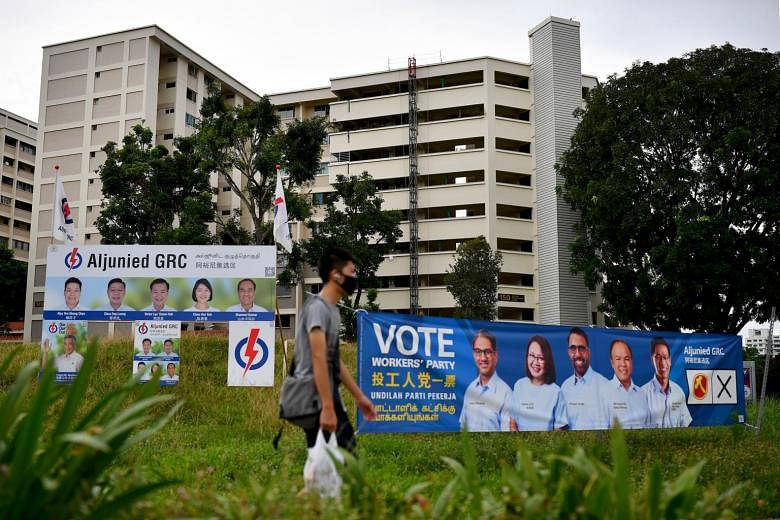Tomorrow, voters cast their ballots in the first general election to be held in a crisis since GE2001. But the circumstances could not be more different.
In the snap polls called in the wake of the Sept 11, 2001, terror attacks in the United States and amid a recession, just 29 of the 84 seats were contested - and the PAP won a landslide 75.3 per cent of the vote.
Every election since has been a milestone for Singapore politics.
GE2006 was the first election since 1988 when the ruling party was not returned to power on Nomination Day, with 47 out of 84 seats contested. The People's Action Party won 66.6 per cent of the popular vote.
GE2011 saw an invigorated opposition contest 82 out of 87 seats, and the Workers' Party won Aljunied GRC with 54.7 per cent of the vote, in an electoral breakthrough described by observers as a "new normal". The PAP's share of the popular vote dropped to 60.1 per cent, and many heavyweights saw the vote share in their constituencies dip to new lows - between 50 per cent and 60 per cent.
GE2015 saw all seats contested for the first time since independence. It also saw a landslide for the PAP, which swept 83 out of 89 seats and saw its vote share surge 9.8 points, winning 69.9 per cent of the popular vote.
GE2020 sees all 93 seats contested, but is also an unusual one - the first election without physical rallies, which many voters see as a once-in-five-years highlight. Safe distancing regulations and restrictions on gathering in groups larger than five have made this a campaign without handshakes as well.
But over the past nine days, candidates from all parties have pounded the ground, going door to door, floor by floor in HDB blocks, and canvassing for votes at coffee shops and hawker centres. They also reached out to voters in new ways, through virtual dialogues, e-rallies and videos.
A key question on many minds is how the PAP will fare when the votes are tallied up tomorrow night.
PAP incumbents, as well as new candidates, have, by and large, received a warm reception from voters.
But there is also a sense that the ground is not as sweet as it was in 2015. Then, the feel-good vibe following the SG50 celebrations, as well as the death of founding prime minister Lee Kuan Yew, helped swing some voters to the PAP.
This time, however, a deep health and economic crisis has meant that jobs, cost of living, income and retirement security, and the future are on the minds of many as Singapore braces itself for what is set to be the worst recession since independence. Anxiety, and even anger, is palpable in some quarters.
Yet, neither is the ground as sour as it was in 2011.
A key pitch from the PAP, that Prime Minister Lee Hsien Loong and other leaders have reiterated over the campaign, is that Singapore needs the best team at the helm, and the party has assembled a strong slate of new and experienced candidates to serve residents at the local level, and shape policies at the national level.
And at a time when the country is facing what its leaders have called the "crisis of a generation" brought on by the Covid-19 pandemic, the PAP says it needs the strongest mandate to steer Singapore forward in a turbulent world.
On the other side, opposition leaders argue that an elected opposition presence in Parliament is needed as a check on the Government.
The Workers' Party (WP), which is contesting 21 seats, says it represents a constructive opposition, and has built up a base of supporters especially in the east.
The new Progress Singapore Party (PSP) has made greater accountability and transparency a key plank of its campaign, and has made a splash in its maiden election - contesting 24 seats.
The Singapore Democratic Party (SDP), which is contesting 11 seats, has pushed its proposals to suspend the goods and services tax and introduce retrenchment benefits and regular income for retirees.
It is calling on voters to deny the PAP a clean sweep - and in some cases also its super majority - and argue that its presence in Parliament will help improve policies and build a better future for Singaporeans.
This is a view that resonates with a growing number of younger voters, some of whom do not want to see a Parliament with all constituencies represented by PAP MPs.
The PAP is aware of this sentiment, and in the recent term of government amended the Constitution to guarantee a minimum of 12 opposition members, with equal voting rights, through the Non-Constituency MP (NCMP) scheme, which was debated during the campaign.
Some might argue that these MPs are elected, in the sense that they are the best-performing opposition candidates at the general election.
But some voters might prefer elected MPs to represent them. Amid concerns raised by some opposition members of a "wipeout" tomorrow, their votes will once again determine whether these constituencies switch hands, at a time when the WP has consolidated its key leaders in Aljunied GRC to defend it and seek a third term.
The three biggest parties are also putting up stiff competition in a number of constituencies that will be keenly watched.
The toughest fight appears to be in Sengkang GRC, which includes the former Punggol East SMC, which WP held briefly following a 2013 by-election.
The outcome in East Coast GRC will be an indication of how far Deputy Prime Minister Heng Swee Keat's surprise move to helm the team has helped shore up the PAP slate against dogged WP challengers who have been walking the ground there since the past three elections, when the constituency was keenly contested.
Meanwhile, West Coast GRC will be watched as a test of the PSP's appeal in a complex constituency where its leader and former PAP backbencher Tan Cheng Bock is up against ministers S. Iswaran and Desmond Lee.
As for the SDP, the intense contests in Bukit Batok and Bukit Panjang SMCs, where its top two leaders are standing, deserve watching to see whether the party has enough support to enter Parliament - whether as elected MPs or through the NCMP scheme - for the first time since 1997.
Yesterday, messages were flying about on social media platforms on these and other constituencies, giving contradictory predictions, odds and outcomes. Some pointed to a tightening of several of these key races.
Seasoned political watchers will be wary of making too much of this though. But, as with all elections, which have been famously compared to casting of the political dice, it would be wise to brace oneself for surprises when the results are out.


